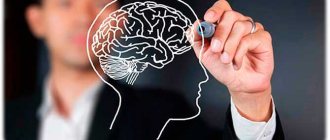Hello everyone, friends.
In the previous article, I wrote about the mind, but only about its philosophical component, that is, about its structure, rational thinking, about the layers of the mind and the cooperation of these layers.
In this article I want to touch on the psychological side of the mind, that is, the mind of the soul, or rather its participation in the work of the mind. Again, first I will quote the generally accepted definition of the mind in psychology.
“Reason in a broad sense is the rational principle in a person, the developed ability to think and act based on logic and facts. Reasonable in such a broad sense is rational, that is, well-calculated, thoughtful and balanced, having a clear logic and leading to the goal in the most reliable way. Rational - completely reasonable, justified, expedient, done “with the head.” … Reason in a narrower sense is not just rationality. Anti-human projects can also be rational; an evil person can be completely rational.
But a reasonable person is a person who controls himself, is capable of answering for himself, and therefore a reasonable person cannot be evil.”.
Mental stomach
Reason is a highly important function of our consciousness, since it allows us to correctly digest the experience gained. Here we can draw an analogy with the fire of digestion. According to the ancient science of Ayurveda, if the digestive fire is poor, the food will not be digested, it will turn into poison and will poison the person, causing illness. Such a person will not have energy and strength. In the same way, a weak mind cannot digest the experience that a person receives when coming into contact with this world.
Undigested life experience turns into mental poison, which gives rise to illnesses at the mental level and moves to the physical, somatic level.
For example, grievances are a consequence of experiences that have not been digested by the mind.
Our fate, God, providence have given us unpleasant experiences in life. We deserve this experience. We ourselves did something like this before and now we have received the result of these actions. We need to take this experience, digest it, learn a lesson from it, translate it into an assimilated form and make it our property, our wealth. If we cannot process this experience, it turns into mental poison. This poison destroys us from the inside, it turns into depression, anger, negativism, constant mental pain that a person pours out on others. People with weak minds who have lived a long life turn into impossible creatures, a source of constant negativity. The reason for this is simple - they did not have enough intelligence to digest their life experiences. And vice versa, people with a strong mind, who have survived, digested this experience, accepted it, turn it into some wonderful qualities. It's nice to communicate with such people. We must develop intelligence in ourselves, this ability to digest, to understand our life experiences.
Do chimpanzees have a theory of mind?
A paper published by Premack and Woodruff in 1978 first coined the term theory of mind. But it wasn't about people. The central insight of the article is Premack and Woodruff's reflections on the behavior of the primate chimpanzees, who behave as if they understand the thoughts of others.
Summer lemonade: a simple recipe with melon and watermelon balls
Bio-cocktail for the garden helps me harvest a very large harvest of tomatoes and peppers
Doll eyelashes and “beehives”: why the fashion of the 60s will not catch on today
Experts tried to find out whether monkeys are able to take into account the mental state of a person. The animals took part in an experiment where they had to predict human behavior. The results showed that chimpanzees are able to recognize mental states such as intention and purpose.
This was one of those moments in the history of science when scientists looked beyond the realm. It turned out that some things in the world are so omnipresent and inevitable that we don’t even notice them until the moment they disappear. For example, few people notice the background music in a restaurant or cafe until it stops playing.
The same applies to theory of mind. It's so obvious that we don't think about it until something important happens.
Mind and Karma
What happens to our karma
when do we turn on our minds?
karma
in our daily life . In the form of what are the most common things?
What we encounter every day is a manifestation of our karma
. These are the various thoughts and desires that we have.
From time to time we become victims of these desires. They take over our consciousness and we do something we shouldn't do. This is karma
.
These are very strong samskaras
or mental imprints with very strong energy that come to the surface of our consciousness at a certain moment under the influence of various planets. The time comes, and the unknown force within us becomes completely uncontrollable, almost impossible to cope with. Lust, anger, and other feelings and emotions gain incredible strength. Almost every person inevitably faces this sooner or later.
What to do in such a situation? The answer is to not turn off your mind at this moment, even when this force overwhelms us and we realize that we cannot resist it.
This is a simple formula for change - even if karma has overtaken us, we need to make an effort and stay on the platform of reason.
Because usually at such moments the mind tries to retreat. But it is very important to consciously go through this experience caused by an unconscious or subconscious force.
The workings of the human mind
- Yes. And everything would be very good if we knew what the mind is. - Don’t we know? – Noonan was surprised. - Imagine, no. /Strugatsky Brothers “Roadside Picnic”/
Why does a person need reason? Why do we need intelligence at all? What is he doing? What does the human mind look like? How does the mind work? These are just a few of the questions that kicked off this weekend, July 27-28, the scientific meeting “The Work of the Mind,” organized by the Academy of Applied Sciences. At a scientific meeting over the course of two days, Academician of the UAS Oleg Maltsev answered not only a number of questions posed, explaining the structure of the mind and laying out all categories of the mind on the board, but also explained what the environment of the mind is, how it is structured, in what modes it works and how it is connected with human life and activities.
As Oleg Viktorovich said: “I, of course, in two days, in just 8 hours, will not be able to describe to you all the work of the human mind. I didn’t set myself such a task. Most of all, I would like you to begin to study your own mind. This is the best thing that could happen. I just want to help you in this matter and tell you something about this thing.”
When people are considered intelligent, they are assigned certain kinds of characteristics. Remember what they say about a person whose mind is more or less in order. They call him adequate, sane, and so on. Otherwise, other words are used in relation to a person: idiot, fool, imbecile, etc. And here I would like to give an example: how the mess with a person’s mind manifests itself in motor reactions. If you give such a person two sticks in his hands and force him to walk, he will fall. This fairly simple example tells us that the mind also influences the coordination of human movements. The mind is a kind of equilibrium “organ” in a person that balances his life and activities.
I would like to demonstrate another figurative explanation using the example of an on-board computer in a car. The on-board computer carries the functions of controlling and balancing the movement, down to how many revolutions the wheel should make at different grip levels. As you understand, a machine has its own tasks, a computer has its own tasks - each device has its own tasks. But there is definitely some computer that tries to balance all the elements. So, many people call the processor in a computer the brain, but it is not the mind. Everything that calculates and produces a series of other procedures is just an element of the mind, but not the whole mind. What sets the balance in a computer? The balance is established by the operating system, the shell - it is the mind of the computer. And the operating system uses the computer processor and other calculated data in some modes in order to keep it all in a balanced state. Just as a computer can burn out and fail, so can a person’s mind fail. In our speech we even have such an expression as “burnt out at work.”
The mind has been studied for quite a long time; it all started with our predecessors. Until the 1950s, these were the only people who thought about the problems of reason and were able to do excellent work in this field. They gave us models of the mind that we still use today. A model is a very convenient thing for practical use, but a model does not always reflect all the functions of the mind. As you understand, there are some operational things, there are things that really require intellectual load, there are some things that do not require any intellectual load at all, there are things that could be, to one degree or another, unknown to a person. a certain point in time. As you can see, the human system lives according to the principle of sufficiency, and the mind regulates everything. For example, why do you need to know how space rockets are designed if you are in no way connected with this field of activity? The principle of sufficiency is present in the human mind.
We have an alarm system that alerts us to our inadequacy. For example, you lack something, you need something, you want a different standard of living, etc. And if you don't need to know much about space rockets and submarines, there are things you need to know a lot about, but you don't know about them. And the external environment spins this mechanism, and you look and, receiving sensations, signals, you begin to understand that something in your life is not enough and something needs to be added, otherwise you feel not entirely good, insecure.
Our signaling system is an external system. It notifies us, for example, that there is no result in life. We begin to somehow fill these “gaps”, read books, look for people who know something about this. But after some time we realize that everything we find does not fill our “gaps”. And here it is important to understand such a thing as the mass of data does not equal replenishability.
That is, you received a huge amount of information, re-read a large amount of the book, but did not complete anything, and did not find an answer to the questions.
So why do we need intelligence? For what? What does he do on his own?
Model of the mind
In applied science there is a model of the mind. But this model does not reflect the activity of the mind; it helps us use the mind at a certain level of development. This model will not provide replenishment.
It turns out that the mind has 4 categories of functions and it is from these categories that 4 amalgams arise:
Similar
Secret toggle switch
At that moment when we, driven by a powerful unconscious force, commit various actions, we need to look at ourselves from the outside and try to smile. If you evaluate what is happening consciously, looking at yourself a little from the outside, and simply observe what is happening, then the impressions of the situation will not leave deep imprints in the memory and will not strengthen the very quality that caused this situation. In the end, one will gradually gain power over circumstances and cease to be an obedient toy in the hands of any qualities (or gunas). Then we will have a conscious experience.
The presence of consciousness allows you to get out of the influence of the unconscious. Most psychotherapeutic techniques are based on this. When the problem becomes conscious, the mind begins to digest it and puts it where it needs to be.
Empathy: its original and immediate foundations
One of the many mental activities under the broad umbrella of “theory of mind” is empathy. Typically, we think of this concept as the ability to emotionally understand other people, while theory of mind, in its more rigorous sense, involves understanding people's thoughts.
How empathy works and whether it is something separate from theory of mind is still a matter of debate among psychologists. Preston and de Waal's 2002 paper sought to answer a specific question about empathy: "Why do we have it and how does it benefit us?" The psychologist's answer was as follows: empathy encourages prosocial group behavior. Simply put, we want to interact with others if making them feel good makes us feel good in return.
Every time I cook Swedish potatoes, I think of my grandmother
Instead of releasing new, cheaper versions, Tesla has reduced the price of the current Model Y
A simple facade and a minimum of furniture: 2 different houses look like an oasis of calm
Theory of moral sentiments
Adam Smith wrote a work in 1759 that took into account the complete opposite of human nature: we often do things to make others feel good without any tangible benefit to ourselves. In other words, we show empathy. The ongoing contemporary debate in psychology is the same one that Smith addressed in the theory of moral sentiments. One of Smith's ideas is that empathy is based not so much on our ability to understand other people's emotions, but on understanding the situation that caused these feelings.







